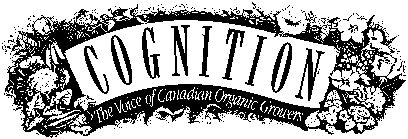

Cognition Index | Virtual Library
| Magazine Rack
Search
| Join the Ecological Solutions Roundtable
CSA PRAIRIE PIONEERS: DAN AND WILMA WIENS
by Celia Guilford
On March 5 & 6, 1993, a crowd of 200 gathered together for Manitoba’s first workshop on Community Shared Agriculture. "People and the Land," they called it, "Sharing the Vision" for both farmers and city people. And people came from all across Canada and some from the States as well. They wanted to put the culture back in agriculture.
Two main forces behind this event were Dan and Wilma Wiens from St. Adolphe, Manitoba. The Wiens began operating their CSA farm in the spring of 1992. It was the first of its kind on the prairies, and within one day of local media coverage, over 200 people had signed up for a $140. share in their harvest.
Dan stresses that it is community shared agriculture, not community supported agriculture. They are sharing the risks as well as the rewards of an agriculture with culture. Two hundred families have bought shares in the Wiens’ farm for two years now. These people have family doctors and lawyers; now they have a family farmer.
CSA offers benefits to both farmers and the consumers. The farmers get full retail price for the food they grow; they have a guaranteed market, with income upfront, thereby reducing the need for bank loans; and they have the opportunity to get to know the people they grow food for. The consumers feel empowered because their food dollars go directly to the farmers, supporting a local economy; the fresh produce they receive is grown organically; and the variety changes with the season so that it is a learning experience as well. In getting to know their farmers, consumers feel good about where their food comes from.
Because of the interest generated by other farmers and consumers, we now have seven CSA farms in Manitoba. Prices per share have risen to better reflect costs, and vary between $180 and $250. Dan believes that high consumer interest in the concept reflects a desire for wholesome food and the wish to be a part of a food system that makes more sense to them.
The Wiens’ Twin Creek Shared Farm is located 10 km south of Winnipeg. Each week, July through October, they load their half-ton with produce and head for the city. With eight different drop-off points, they deliver to each at a preset time and day. Depot co-ordinators make sure everything runs smoothly and take holidaying sharers’ baskets to the local food bank. The produce is delivered in blue box recycling containers, which come back each week with scraps for the Wiens’ compost pile.
Both 1992 and 1993 have been unusually cold, wet summers for Manitoba. This has hurt both the quality and the quantity of the crop, but consumers are still very happy with their weekly baskets. A survey at the end of the Wiens’ first CSA year gave them valuable insight into how their sharers felt. Priorities included: having fresh, tasty vegetables; having chemical-free vegetables; helping the environment; supporting a local farmer by sharing the risk; and supporting a local economy. Issues of lesser importance included: community involvement; connection to a farm; and saving money on groceries. Many of their sharers commented on how much fun it was to be surprised each week with the various vegetables; others said they would appreciate a weekly forecast on the vegetables to enable them to plan their menus. Ninety-six per cent of first year sharers stayed on for the second year.
CSA farming makes economic and environmental sense. Dan states that "if just 20 per cent of the population of Winnipeg were to purchase food for 14 weeks – the rest of the time Safeway’s got them – if they were to purchase their vegetables, poultry, eggs and other things through a direct marketing scheme or shared farming, that would create 1000 farms. This is not replacing any farms; it is just utilizing available land."
As one of the Wiens’ sharers said at the end of last year’s season, "This isn’t about an economic arrangement between the farmer and the urbanite. It’s about friendship."
Copyright © 1993.
Celia GuilfordReprinted with permission. All rights reserved.
Info Request | Services | Become EAP Member | Site Map
Give us your comments about the EAP site
Ecological Agriculture Projects, McGill University (Macdonald
Campus)
Ste-Anne-de-Bellevue, QC, H9X 3V9 Canada
Telephone:
(514)-398-7771
Fax:
(514)-398-7621
Email: info@eap.mcgill.ca
To report problems or otherwise comment on the structure of this site, send mail to the Webmaster